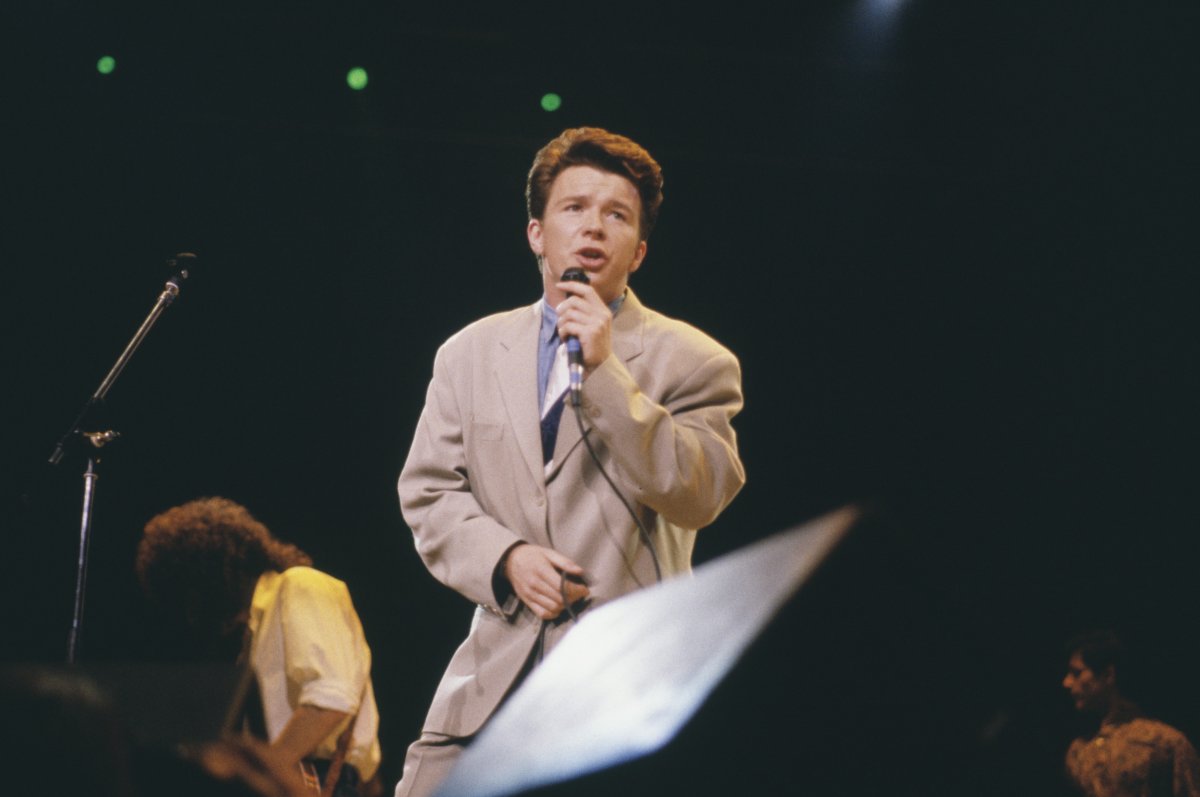
The first time British singer Rick Astley was introduced to what would become his smash pop hit, 1987's "Never Gonna Give You Up," was when Mike Stock of the production team Stock Aitken Waterman sang the song's melody and worked out the chords in the recording studio. At the time, Astley was not only a signed artist to SAW but also served as their tea boy—a sort of apprentice or intern who did odd jobs for them.
"I'm literally brewing the coffee while this is happening," Astley tells Newsweek. "I kind of thought, 'Oh that's interesting,' because it's super catchy. As I heard it being built, I said to myself, 'If I was in a club with my friends, I'd dance to that.'"
Released 35 years ago, "Never Gonna Give You Up," which appeared on Astley's debut album Whenever You Need Somebody, became the blue-eyed soul singer's first No. 1 smash in the U.S., followed by the hit singles "Together Forever" and "It Would Take a Strong Strong Man." Not only "Never Gonna Give You Up" has become Astley's signature song but it's famously associated with the viral Rickroll internet meme from the last 15 years. Meanwhile, "Never Gonna Give You Up" has racked up over 1 billion views on YouTube and nearly 600 million streams on Spotify.
To mark the 35th anniversary of Whenever You Need Somebody, BMG recently reissued a deluxe special edition of the album with bonus material, including B-sides, remixes and reimagined versions of several of the album's original songs. The reissue coincides with Astley's current tour of the States with New Kids on the Block, Salt-N-Pepa and En Vogue.
"When the record label said, 'Look, we want to re-issue the album,' I just said, 'Why?' Because every bit of music that's ever been made is out there on the Internet right now.' But I think what they convinced me of–and I think I've done this a few times–it's kind of like a remembrance of a moment in time where people were. It's a way to actually have ownership of their fandom for them," Astley said.
Asked about Whenever You Need Somebody's 35th anniversary, Astley calls it mad, given the fact that he went on a long hiatus from the music business after the major success he achieved in the late 1980s.
"When I go back to those early days of making that record, it's really hard to even remember who I was then, partly also because I didn't do it for like 15 years or more, so I haven't been doing it all those years–I kind of retired...I look in the mirror and go, 'Well, I can recognize that guy, but he's a different dude these days.' So it's really weird, honestly."

Prior to recording Whenever You Need Somebody, Astley, then in his early 20s, had hooked up with the British songwriting and production team of Mike Stock, Matt Aitken and Pete Waterman, all of whom were responsible for numerous dance-oriented pop hits during the 1980s and early 1990s—among them Dead or Alive's "You Spin Me Round," Donna Summer's "This Time I Know It's for Real," Bananarama's "Venus" and Kylie Minogue's "I Should Be So Lucky."
"At that point, I signed to their production company," recalls Astley, "and they said, 'Look, we're not going to get around to making a record with you for a while. Do you want to come and hang out at the studio and you can help with the other kids and do all the different preparation at sessions and all that?'—basically a tea boy. And I said, 'Yeah, I'm in.' Obviously, I wanted to make a record. That's why I signed with them.
"I've prepared their sessions and I learned stuff from the tape ops, the engineers. I got to do my demos at night and on the weekends with the engineers that are making No. 1 records, which was absolutely crazy. I was really lucky because I got to go to the pub with [SAW] every night and listen to them talk about production and certain records that they'd heard from America and loved and thought, 'How can we do a bit of that?' I got to see the underbelly of how they were making records before they made mine."
Astley had an inkling that the SAW-written "Never Gonna Give You Up" had the potential of becoming a hit.
"It was obviously very melodic and very pop, but it's got a bit of a groove to it," he says of his early impression of the song. "I had a cassette of it and I went on a ski holiday with a friend who was one of the engineers at the studio. This is six months before it was released, so this was an early version of it. I remember listening to it and just thinking, 'Well, that's a hit. The way they produced it, I think that's a hit.'"
Along with the song, the original video for "Never Gonna Give You Up" would become memorable again in its own right about 20 years later. The clothes that Astley wore for the shoot actually belonged to him: the raincoat, the blazer and the double denim.
"That's why I think in a bizarre way, there's a bit of charm to that video, which is just total naivety because it's just a young kid in clothes that he bought [and standing] against the chain link fence or a brick wall. All the other guys in [the video]—the dancers, and the guy behind the bar—I'm looking at them going, 'Why am I in this video? Why don't you just film them?'"
Showcasing Astley's booming, soulful voice, "Never Gonna Give You Up" went to No. 1 first in the singer's native Britain and then later in the States.
"I think it taught me the value of how good that song is," he explains, "and I can say that because I didn't write it. It just was big everywhere. I look back on my time with SAW with fond memories because I got in at the right time, I think."
More hits for Astley, such as "Together Forever," "It Would Take a Strong Strong Man" and "She Wants to Dance With Me," followed. But by the early 1990s, Astley split from SAW and did a stylistic 180-degree turn with his third album Free. Its soulful ballad, "Cry for Help," was a noticeable departure from the hi-NRG dance-pop that the singer had previously been known for.
"In pop music, unless you're one of the absolute all-time greats, you don't get a very long career," Astley says about the transition. "I just said to myself, 'You know what? This might be the last record that they let you make, so do whatever you want to do, because you might regret it if you don't.'"
After 1993's Body and Soul album, Astley went on a long hiatus from music; by that period he got married and raised a family. Slowly and organically, he reemerged and started writing and recording music once again as well as performing at '80s-oriented retro shows. His 2016 comeback record, titled 50, hit No. 1 on the U.K. chart.
"I made that 50 record just because my birthday was coming up," he says. "I hadn't made a record in years and years. I'm so proud of it for that because I played everything: I wrote it all, I produced it, I did everything. So it's sort of me getting my hands dirty and saying, 'That's what I can do.'"
Around the same time that Astley was returning to music, the now-famous rickrolling meme—in which a user is pranked into clicking a link to the singer's "Never Gonna Give You Up" video started to take hold. It has since become part of pop culture as evidenced by the song's use in an episode of Ted Lasso. Nearly 20 years since the meme's explosion, Astley remains good-natured about it.
"My daughter summed it up really, really well when she was about 15-16. She said, 'You do realize it's got nothing to do with you.' I don't run away from it, I don't deny it, I don't try and fight it, and there's no negativity with it. I embrace it a little bit, but I don't embrace it too tight because it's got nothing to do with me. Whatever the benefits are, I'm more than happy to take them. And I thank the universe and the internet for it.

"It's very hard to try to get my head around when you are the guy in the video. When I look at that, it's me obviously. I'm sure anybody my age can look back in photographs and videos of themselves and go, 'Yeah, yeah, that's me. But that's a different person.' And I'm a bit of the same. I'm just kind of careful about not wanting to milk it. I'm really happy to play along with it because it's part of my DNA. I don't wanna deny it, but I also don't wanna milk it. I think I've got a comfort zone with it. That song has been really, really good to me, and so I'm happy with that."
The song has also led to a friendship between Astley, a closet rock fan, and Foo Fighters as both of them performed "Never Gonna Give You Up" together live in Japan in 2017.
"Would that have happened with one of my other songs?" asks Astley. "No, it wouldn't. It happened because 'Never Gonna Give You Up' has become something else. And I'm just grateful for that. I understand that the artists want to run away from their biggest song sometimes because they want to scream and shout, 'But I've done other things!', and I get it. I think I'm over that, really."
These days, Astley is still performing "Never Gonna Give Up," as the case during his current tour with New Kids on the Block, an experience that the singer has described as fun.
"This is like doing a party, it's just nuts. It is the easiest gig I have ever done because you're going out to an arena full of people who are already screaming and shouting and in the mood. So yeah, it's pretty crazy actually, I can't explain it because it is a gig, but it's not like a gig. It's mad, to be honest."
Uncommon Knowledge
Newsweek is committed to challenging conventional wisdom and finding connections in the search for common ground.
Newsweek is committed to challenging conventional wisdom and finding connections in the search for common ground.
About the writer
To read how Newsweek uses AI as a newsroom tool, Click here.








